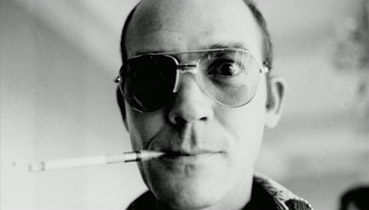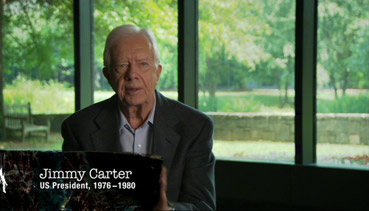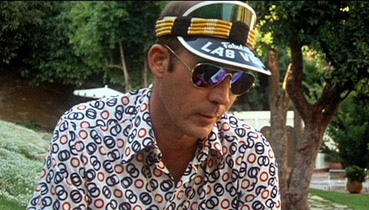| |
Gonzo: a style of journalism which is written subjectively, often including the reporter as part of the story via a first person narrative. The style tends to blend factual and fictional elements to emphasize an underlying message and engage the reader. |
| |
Wikipedia |
I'll admit that my ears pricked when I first heard about Gonzo: The Life and Work of Dr. Hunter S. Thompson, probably the year's most unambiguous film title. A long-time fan of Dr. Thompson's writing, my interest in the man was enhanced several degrees by the documentary work of his friend and associate of many years, Wayne Ewing, whose 2003 Breakfast With Hunter I previously proclaimed as THE Hunter S. Thompson documentary. It's a claim I began seeing made of this new film on the good Doctor's life, one whose scope is wider than Ewing's more personal, direct cinema piece.
I'll make the same assumption I did at the start of my review of Breakfast With Hunter, that a good many of you know who Hunter S. Thompson is, have read at least some of his work and be aware of his sometimes wild life and consistent refusal to bow down to convention. For those new to the name (seriously, where have you been?) then I see little point in repeating myself, and you'll find a brief introduction in the Breakfast With Hunter review here.

Gonzo: The Life and Work of Dr. Hunter S. Thompson is true to its title, providing as it does an overview of Hunter's writing career and colourful private life, from his first journalistic assignments to his suicide in 2005. Following the documentary portrait structure almost to the letter, it kicks off with some brief sound bites and Hunter's literary response to the 9/11 attacks, then settles down for a chronological trip through his career by way of newly shot interviews, archive footage and photographs, audio recordings, staged reconstructions, film extracts, book readings, and footage borrowed from other documentary works, Ewing's included.
As an introduction to Hunter and his work, Gonzo does its job well, being a smartly assembled and enjoyable breeze through a career that, in order to cover in the sort of detail the subject really demands, would require at least another couple of hours of screen time. The interviews in particular are both enjoyable and intermittently surprising – I was expecting to hear from associates like artist Ralph Steadman and Rolling Stone editor Jann Wenner, but to hear tributes from the likes of ex-President Jimmy Carter and Nixon speech writer Pat Buchanan genuinely caught be on the hop. Extracts from Hunter's work, meanwhile, are read by Johnny Depp, who in preparation for his role in Terry Gilliam's film adaptation of Fear & Loathing in Las Vegas spent enough time in Thompson's company for the two to become good friends – it was Depp who footed the considerable bill for his elaborate funeral (the preparations for which are detailed in Wayne Ewing's When I Die). Pleasingly, all of the documentaries sourced are credited on the clips themselves, making it easier to chase up the originals if you're hooked by the extracts. A few were actually new to me, the most eye-opening of which has Hunter making an early career appearance on the TV show To Tell the Truth, which provides a rare glimpse of a quieter, more self-conscious Hunter who has yet to explore his wilder side.
While the span of its coverage is considerably greater, the area where Gonzo inevitably loses out to Breakfast with Hunter is in the latter film's intimate relationship with its subject, an area where direct cinema almost always triumphs over the more formal documentary style. The included songs are all appropriate to Hunter's taste and the era being portrayed, but in the second half the film develops an infuriating habit of matching their lyrics to twists in the story, so when Thomas Eagleton is revealed to have had shock therapy we get Little Anthony and The Imperials singing "We'll I think I'm going out of my head"; when George McGovern wins the party nomination against all odds, Hot Chocolate pipe up with "I believe in miracles"; when biographer Douglas Brinkley talks about the contradiction of Hunter's dual role as outlaw and responsible family man we hear The Clovers cooing "Devil or angel, I can't make up my mind"; and when Hunter buys a boat, Lyle Lovett kicks in with "If I had a boat, I'd go out on the ocean..." I would have genuinely screamed out loud at the use of Spirit in the Sky as the preparations are made for Hunter's funeral ("When I die and they lay me to rest...") were it not for the knowledge that this was one of his favourite songs.

That there are gaps in the story is an inevitable consequence of compressing the details of a life this full into a two-hour running time, so there's no real coverage of Hunter's later campaigning work on behalf of his local community or his very vocal support for Lisl Auman, a woman convicted of murder on the shakiest of evidence and who credits Hunter as instrumental in securing her freedom (the case was covered by Ewing in his 2006 documentary Free Lisl: Fear & Loathing in Denver). Other omissions appear to have been down to concern about legal issues – part of the pivotal confrontation between Hunter and director Alex Cox from Breakfast With Hunter is included, but Cox is neither shown nor named – while the replacement of Johnny Depp's delivery of the famous Wave speech from the film version of Fear & Loathing in Las Vegas with a new reading by the actor was driven by Depp's conviction that he hadn't nailed the speech properly in the film. I guess we'll have to disagree on that one.
But these are small complaints for a film that largely delivers on its title and provides a comprehensive overview of Hunter's life and work, and does so in entertaining and informative fashion. The rarer archive material, the interviews and the sheer breadth of the coverage make this the perfect introduction to the man and his writings, and if it persuades a few novices to rush out and read his books then it will have done it's job. That I still prefer Breakfast With Hunter probably says more about my taste in documentary than it does about the films themselves.
Any film whose content includes considerable amounts of archive footage from a variety of media of various vintage is hard to accurately judge the transfer quality of, but judging by the interview material shot specifically for the film, this is a solid job, and one that's been taken straight from the video master rather than the film print. Contrast and sharpness here are fine but inevitably vary in the archive footage, which in keeping with current trends has been cropped from its original 4:3 ratio to fill the 1.78:1 anamorphic screen here.

The Dolby 2.0 stereo and 5.1 surround tracks do not differ that wildly, though the 5.1 is slightly fuller and sticks the voices in the middle rather than spreading them over the front stage. Frontal separation on the music is very good, but there's not a huge amount happening on the surrounds.
Commentary by director Alex Gibney
Not the sort of film you'd think would benefit from a commentary track, given that most of it is made up of interviews and archive material, but after a brief bit of pointing out the obvious, Gibney finds plenty to talk about, dividing his time between personal opinion – he's a huge admirer of the artwork of Ralph Steadman, as are we all, and had a lot of time for Terry Gilliam's film version of Fear & Loathing in Las Vegas – and background detail on the production, such as how helpful interviewees were, the difficulty of tracking down clips, that sort of thing. It's actually a lot more interesting than it sounds, and does make you appreciate the lengths documentary filmmakers have to sometimes go to in order to secure material we as viewers tend to take for granted.
Deleted / Extended Scenes (15:02)
This section kicks off with two extracts from The Gonzo Tapes, recorded by Hunter and Oscar Acosta on their legendary Las Vegas trip, which serve as a most effective sales pitch for the five CD set, at least for Hunter devotees. There's also home movie footage of Hunter playing football in the snow, an extraordinary ad for the San Francisco Examiner, grabbed footage of a book signing, a sequence about ‘shotgun art', and some rather camp gooning about at Owl Farm, which I presume was shot by Ewing.
Extended Interviews (45:44)
Exactly what it says, a collection of additional interview material from twelve of those interviewed for the film and containing a variety of anecdotes, many of them amusing and all of real interest. Subjects covered include some rather aggressive poetry rejection letters, Hunter's driving, the origins of the term 'Gonzo', the unpublished NRA manuscript, Gary Hart's first experience of Owl Farm, Hunter's way with money, his somewhat extreme method of getting interview time with Jimmy Carter, his funeral plans, problems at the Canadian border, Hunter's brief stint as a swimming coach, and an alarming lunch with Tom Wolfe. Ralph Steadman takes us on a welcome trip through some of his drawings of Hunter and treats us to his impersonation of the man, and it's all rounded off with a 13 minute archive interview with Hunter by TV12 about the follies of the Nixon government following the Watergate revelations.
Wayward and Weary (4:01)
Tift Merritt performs the song Wayward and Weary, which she wrote after seeing this film.
Interview with Alex Gibney (22:24)
Without duplicating the commentary track to any serious degree, Gibney explains how he came to the project and how it differs from previous films and talks about his partial affinity with Hunter, the film's style, the experience of making it ("some kind of hell"), the process of sourcing the archive footage, securing the interviews, his views on this finished film, and Hunter's legacy and career.
Steadman Drawings
Over 70 drawings and a couple of modified photos from Ralph Steadman, largely of Hunter and including his iconic work for Fear & Loathing ion Las Vegas.
Gallery
Half a ton of photos and pertinent documents relating to Hunter at various stages of his life, which are subdivided into categories.
Trailer (2:32)
An energetically cut and persuasive sell.
A busy, informative and always engaging documentary portrait that would make an ideal introduction to Thompson and his writing, although I'd keep Breakfast With Hunter handy as the perfect follow-though. Optimum's disc is an absolute winner, the collection of extras included here exceeding in quantity and quality those on a fair few 2-disc sets. Recommended.
|